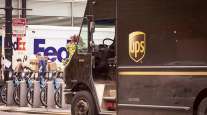Pilotless FedEx, Reliable Robotics Plane Completes Flight

[Stay on top of transportation news: Get TTNews in your inbox.]
Reliable Robotics Corp. has flown a small cargo plane on loan from FedEx Corp. without a human on board, a step toward the autonomous flight startup winning regulatory approval for its remote-pilot system.
In coordination with the Federal Aviation Administration, the 12-minute flight of the Cessna 208B Grand Caravan on Nov. 21 took off from and landed at Hollister Municipal Airport in Northern California. A remote pilot handled all the radio calls and monitored the plane during the flight from about 50 miles away at the company’s command center in Mountain View, Calif. It was Reliable Robotics’ second automated flight, after flying a much smaller Cessna 172 in 2019.
“We demonstrated automated taxiing, takeoff and automated landing, all without a pilot on board,” said Robert Rose, co-founder and CEO of Reliable Robotics in an interview. “It was like a normal operation with the FAA.”
The flight is part of the startup’s effort to gain full approval from the FAA. The agency accepted Reliable Robotics’ plan for certifying the technology this summer after a four-year effort, said Rose, who expects to get FAA regulatory approval within two years. Since 2021, the company has worked under contracts with the Air Force, which is interested in the system for logistics and refueling aircraft, Rose said.
The system will be used by remote pilots who supervise only one aircraft at a time rather than one pilot managing multiple, autonomous flights, he said.
The remote pilot is responsible for the safe operation of the aircraft and watches things such as air speed, altitude and predicted flight path. The pilot can maneuver the plane if needed to avoid unexpected aircraft or objects, but doesn’t control the plane during the flight. During the November test, the remote pilot didn’t have to do anything besides the radio calls, Rose said.
By having remote pilots, air cargo companies, such as FedEx or UPS Inc., could boost efficiency because a pilot would be able to do an early morning flight on the East Coast and then switch to guide a plane on the West Coast, he said. By not having pilots tied physically to the aircraft, planes can be repositioned more easily to match where demand is strongest, he said.
FedEx hasn’t committed to using the technology but said it’s looking for innovations that could help enhance service to remote locations.
“We look forward to further testing and learning throughout this collaboration with Reliable Robotics,” the company said in an emailed statement.
As with autonomous vehicles, the system must prove it’s as safe or safer than human operators before it’s adopted widely. Flights will start in cargo and eventually be adopted by airlines, helping ease scheduling problems and reduce the shortage of pilots. Instead of eliminating jobs, the technology will create more flying demand by lowering costs, Rose said.
Want more news? Listen to today's daily briefing above or go here for more info
“The near future, I believe, is going to be having remote pilots in control centers managing one aircraft at a time,” he said. “There’s huge cost savings in that.”
Reliable Robotics now runs a small cargo airline in New Mexico with five piloted Cessna Caravans that does work for FedEx hauling packages. The purpose is to understand the industry needs and to function as an “incubator for this technology.” But there are still kinks to be worked out.
“Our system doesn’t do automated engine starts, so somebody has to be in the plane to start the engine,” he said. “We’re working on that.”
FedEx Corp. ranks No. 3 on the Transport Topics Top 50 list of the largest global freight companies and No. 2 on the TT100 for-hire list.




